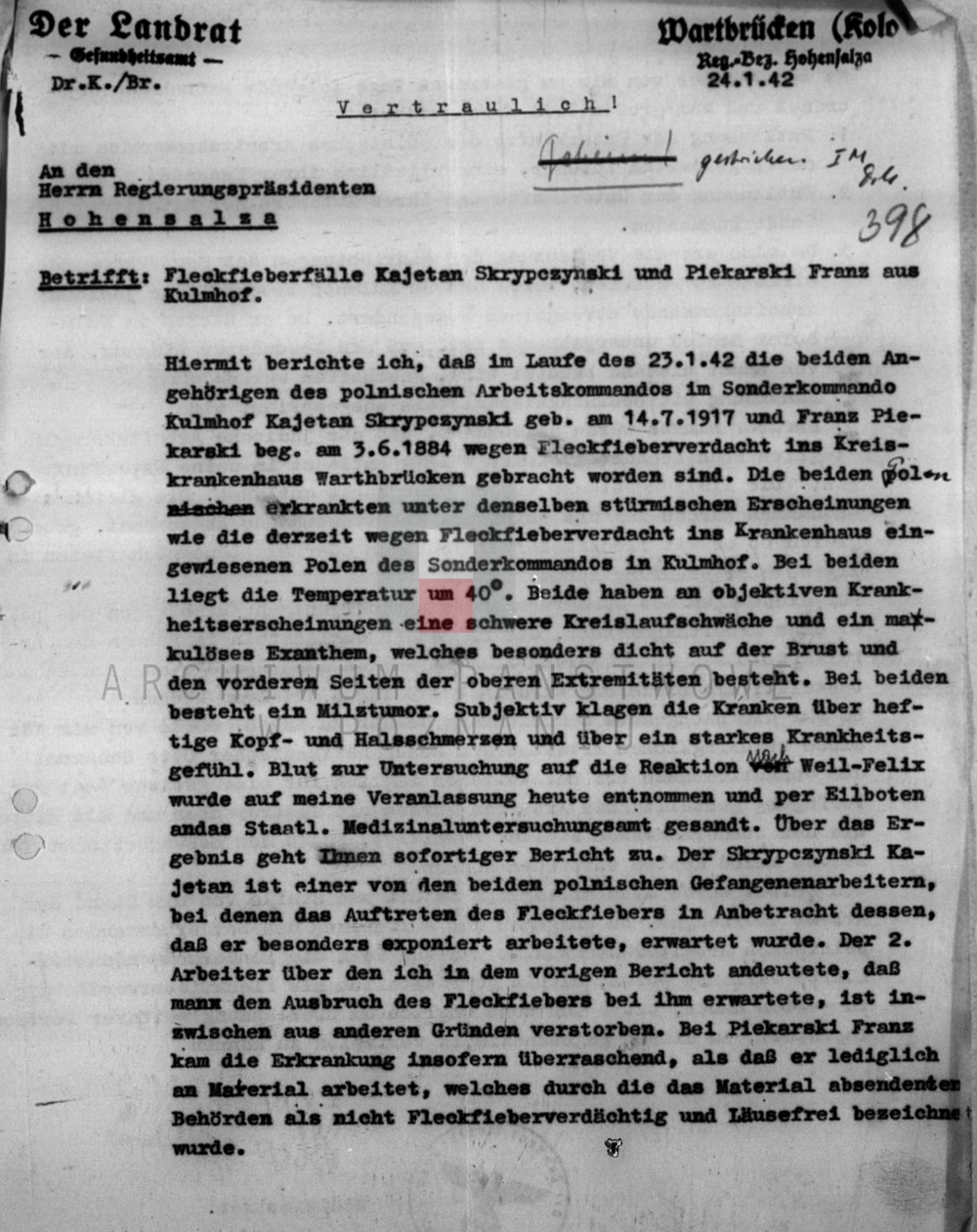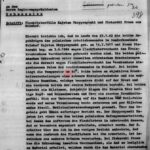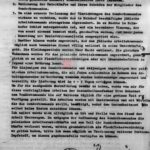Introduction
In January 1942, authorities in the Warthegau region grappled with the spread of typhus originating from Sinti and Roma victims, who had been deported from the Litzmannstadt ghetto, to the extermination site of Sonderkommando Kulmhof. At least half of the Polish workers in the Sonderkommando were infected. The local health office detailed these typhus cases in Kulmhof in a letter to the president of the government of Hohensalza (Inowrocław) on January 24, 1942. The report referred to the “members of the Sonderkommando”, “Polish prisoner workers” and “Jewish working detail”, each group housed separately. Additionally, it mentioned the Jewish prisoners are accommodated in the palace of Kulmhof.
Document
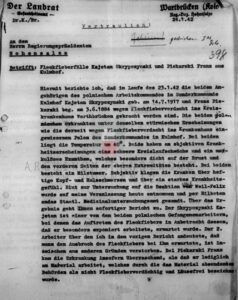
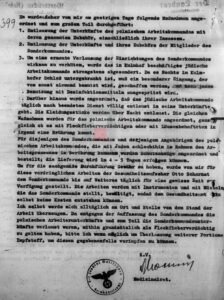
Der Landrat
-Gesundheitsamt –
Dr. K./Br.
Vertraulich!Geheim!
Wartbrücken (Kolo)
Reg.-Bez.-Hohensalza
24.1.42
An den
Herrn Regierungspräsidenten
Hohensalza
Betrifft: Fleckfieberfälle Kajetan Skrypczynaki und Piekarski Franz aus Kulmhof.
Hiermit berichte ich, daß im Laufe des 23.1.42 die beiden Angehörigen des polnischen Arbeitskommandos im Sonderkommando Kulmhof Kajetan Skrypczynaki geb. 14.7.1917 und Franz Piekarski beg. [sic!] am 3.6.1884 wegen Fleckfieberverdacht ins Kreiskrankenhaus Warthbrücken gebracht worden sind. Die beiden Polen erkrankten unter denselben stürmischen Erscheinungen wie die derzeit wegen Fleckfieberverdacht ins Krankenhaus eingewiesenen Polen des Sonderkommandos in Kulmhof. Bei beiden liegt die Temperatur um 40°. Beide haben objektiven [sic!] Krankheitserscheinungen eine schwere Kreislaufschwäche und ein makkulöses Exanthem, welches besonders dicht auf der Brust und den vorderen Seiten der oberen Extremitäten besteht. Bei beiden besteht ein Milztumor. Subjektiv klagen die Kranken über heftige Kopf- und Halsschmerzen und über starkes Krankheitsgefühl. Blut zur Untersuchung auf die Reaktion nach Weil-Felix wurde auf meine Veranlassung heute entnommen und per Eilboten an das Staatl. Medizinaluntersuchungsamt gesandt. Über das Ergebnis geht Ihnen sofortiger Bericht zu. Der Skrypczynski Kajetan ist einer von den beiden polnischen Gefangenenarbeitern, bei denen das Auftreten des Fleckfiebers in Anbetracht dessen, daß er besonders exponiert arbeitete, erwartet wurde. Der 2. Arbeiter über den ich in dem vorigen Bericht andeutete, daß man den Ausbruch des Fleckfiebers bei ihm erwartete, ist inzwischen aus anderen Gründen verstorben. Bei Piekarski Franz kam die Erkrankung insofern überraschend, als daß er lediglich an Material arbeitet, welches durch die das Material absendenden Behörden als nicht Fleckfieberverdächtig und Läusefrei bezeichnet wurde.
Es wurden von mir am gestrigen Tage folgende Maßnahmen angeordnet und zum großen Teil durchgeführt:
1. Entlausung der Unterkünfte des polnischen Arbeitskommandos mit deren gesammten [sic!] Zubehör, einschließlich ihrer Insassen.
2. Entlausung der Unterkünfte und ihres Zubehörs der Mitglieder des Sonderkommandos.
3. Um eine erneute Verlausung der Einrichtungen des Sonderkommandos wirksam zu verhüten, wurde das in Kulmhof beschäftigte jüdische Arbeitskommando strengstens abgesondert. Da es Nachts im Kulmhofer Schloß untergebracht ist, muß ein besonderer Eingang, der von sonst niemand benutzt wird, geschaffen werden, und nach jeder Benutzung mit Desinfektionsmittel ausgespritzt wird.
Darüber hinaus wurde angeordnet, daß das jüdische Arbeitskommando täglich nach beendetem Dienst völlig entlaust in seine Unterkünfte geht. Die Kleidungsstücke werden über Nacht entlaust. Die gleichen Maßnahmen wurden für das polnische Arbeitskommando angeordnet, ganz gleich ob es mit Fleckfieberverdächtigen oder mit Läusenbehafteten in irgend eine Brührung [sic!] kommt.
Für diejenigen des Sonderkommandos und derjenigen Angehörigen des polnischen Arbeitskommandos, die mit Juden schlechthin im Rahmen des Arbeitsprozesses in Berührung kommen, wurden Schutzanzüge angeordnet und bestellt; die Lieferung wird in 4-5 Tagen erfolgen können.
Um für die sachgemäße Durchführung Gewähr zu haben, wurde von mir für diese vordringliche Arbeiten der Gesundheitsaufseher Otto Scharnat dem Sonderkommando bis auf Weiteres täglich für eine gewisse Zeit zur Verfügung gestellt. Die Arbeiten werden mit Instrumenten und mit Mitteln, die das Sonderkommando stellt, bewältigt, sodaß dem Gesundheitsamt selbst keine Kosten entstehen können.
Ich selbst werde mich alltäglich an Ort und Stelle von dem Stand der Arbeit überzeugen. Da entgegen der Auffassung des Sonderkommandos die polnischen Arbeiterunterkünfte und zum Teil die Sonderkommandounterkünfte verlaust waren, mithin grundsätzlich als Fleckfieberverdächtig zu gelten haben, bitte ich wenn möglich weiterer Portionen Impfstoff, um diesen gegebenenfalls verimpfen zu können.
i.V.
[Unterschrift]
Medizinalrat
The County Administrator
-Health Service –
Dr. K./Br.
Confidential!Secret!
Wartbrücken (Kolo)
Gov. District Hohensalza
24.1.42
To
Mr. President of the Government
Hohensalza
Subject: Typhus cases Kajetan Skrypczynaki and Piekarski Franz from Kulmhof.
Hereby I report that on January 23, 1942, the two members of the Polish work detail in the Sonderkommando Kulmhof, Kajetan Skrypczynaki born on July 14, 1917, and Franz Piekarski born on June 3, 1884, were brought to the district hospital Warthbrücken due to suspicion of typhus. Both Poles fell ill with the same severe symptoms as the Poles from the Sonderkommando in Kulmhof who are currently hospitalized due to suspected typhus. Both have a temperature around 40°C. Both show objective signs of illness: severe circulatory weakness and a macular rash, which is particularly dense on the chest and the front sides of the upper extremities. Both have an enlarged spleen. Subjectively, the patients complain of severe headaches and sore throat, as well as a strong sense of illness. Blood for examination for the Weil-Felix reaction was taken today at my request and sent by express messenger to the State Medical Examination Office. You will receive an immediate report on the results. Kajetan Skrypczynski is one of the two Polish prisoner workers in whom the onset of typhus was expected, considering that he worked in a particularly exposed environment. The second worker, about whom I indicated in the previous report that the outbreak of typhus was expected, has since died for other reasons. In the case of Franz Piekarski, the illness came as a surprise, as he only worked with materials that were declared by the authorities sending the materials as not suspicious for typhus and free of lice.
Yesterday, I ordered the following measures, most of which have been implemented:
1. Delousing of the accommodations of the Polish work detail along with all their belongings, including their occupants.
2. Delousing of the accommodations and their belongings of the members of the special commando.
3. In order to effectively prevent re-infestation of the facilities of the special commando, the Jewish work detail employed in Kulmhof has been strictly isolated. Since it is housed in the Kulmhof Castle at night, a special entrance, used exclusively by them, must be created and sprayed with disinfectant after each use. Additionally, it has been ordered that the Jewish work detail undergo complete delousing in their accommodations daily after their shift ends. Their clothing will be deloused overnight. The same measures have been ordered for the Polish work detail, regardless of whether they come into contact with suspected typhus cases or lice-infested individuals. Protective suits have been ordered and will be delivered within 4-5 days for those of the special commando and those members of the Polish work detail who come into contact with Jews during the work process. To ensure proper implementation, I have assigned health supervisor Otto Scharnat to the special commando daily for a certain period of time until further notice. The work will be carried out with instruments and resources provided by the special commando, so no costs will be incurred by the health department itself. I will personally inspect the progress of the work on-site every day. Contrary to the opinion of the special commando, the Polish worker accommodations and partially the special commando accommodations were infested with lice, and therefore must be considered potentially indicative of typhus. If possible, I request further supplies of vaccine to administer if necessary.
On behalf of,
[signature]
Medical Official
Archivial reference:
APP/299/2111, p. 405 and 406.
Cited in:
Alberti, Die Verfolgung und Vernichtung der Juden im Reichsgau Wartheland 1939-1944, p. 430.
